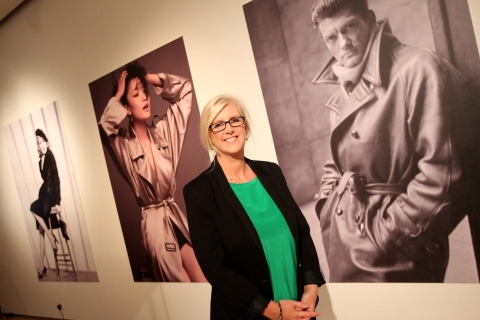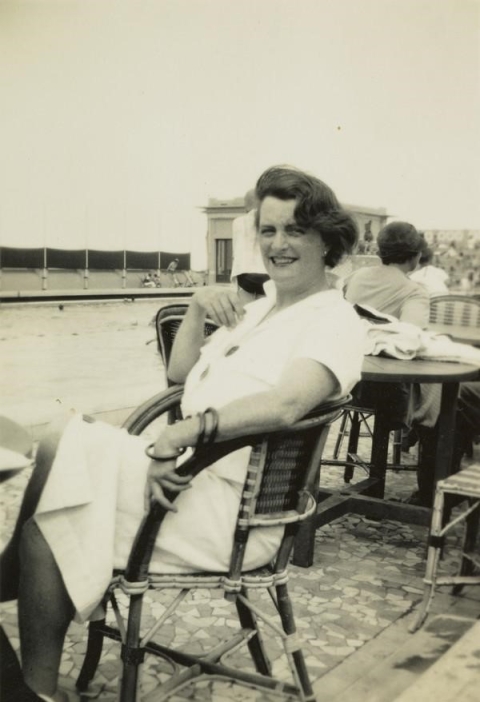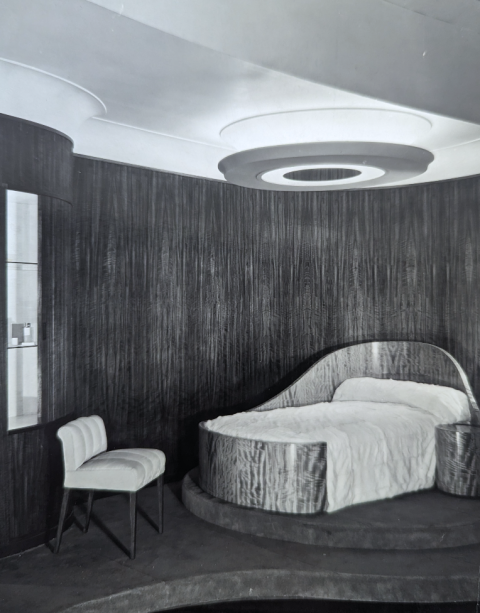

Each month, the Graduate School is sharing a Student Spotlight with our postgraduate research community, highlighting the amazing research being undertaken by our postgraduate researchers.
2 minutes
Our Student Spotlight for July is Tara McKinney Marinus, a first year PhD student in the Faculty of Creative and Cultural Industries.
What is your research?
I am a first year PhD student researching the career and works of Betty Joel (1894 – 1985), a Hong Kong born furniture and interior designer, manufacturing in both Portsmouth and Kingston-upon-Thames. As a collaborative PhD with Portsmouth Museum and Art Gallery, the research will culminate in an exhibition on Betty Joel for the city in 2026-27.

Betty Joel, Le Touquet, France c1938. The Stewart Lockhart Photographic Archive, on loan from George Watson’s College to the National Galleries of Scotland.
Tell us a bit more about your research.
In 1933 The London Weekly Despatch reported that Betty Joel was among the top six women in England earning more than £500 per week (worth £22,000 today). Yet, despite her prolific twenty-year career as a successful interwar designer, producing a broad and pioneering body of work, Joel’s contribution to the development of British design has been overlooked. My research will provide the foundation for a new body of scholarship on the career of Betty Joel and seeks to explore the reasons why her work has lain neglected and largely disregarded within design history to date. By combining an examination of biography with the social, cultural and ideological confluences that are part of the discourse surrounding Joel’s work, the research will present a fresh appraisal. It aims to illuminate the mediation of Joel’s ‘self’ in, and via, the objects to provide a re-evaluation of the agency of her design. The research also inserts itself in the wider context of a reassessment of the history of ‘modern’ furniture and interior design, and the role of women designers in interwar Britain. Joel’s work occupies an important position in British furniture making that reflects the needs of the ‘modern’ woman. Incorporating elements of the Arts & Crafts tradition, while also intersecting with the most up-to-date styles from the Continent, her designs offer a distinctly unique quality. This convergence of styles does not sit neatly in conventional modernist design structures which may have contributed to her omission.
The research will also interrogate the wider influences on her work. Owing to her formative years spent in Hong Kong and China, a visual analysis of objects in conjunction with biography will determine if elements of Oriental styling are present which may stem from a direct innate experience. Furthermore, the innovations of her highly-skilled Portsmouth craftsmen from the yacht-building tradition will be evidenced through ethnographic object studies and the collection of oral histories. By exploring the plurality of these ‘voices’, I aim to demonstrate that wider debates are relevant for reassessing local practices, and reciprocally, that local reality can challenge central paradigms. In doing so, the research will resituate Betty Joel in relation to a more ‘inclusive’ design history, challenging the existing framework of the Modern Movement.
If you would like to feature in our student spotlight section please email graduate.school@port.ac.uk to discuss this further.

Prize winning Betty Joel Ltd bedroom, British Art in Industry exhibition 1935, Royal Academy. The Stewart Lockhart Photographic Archive, on loan from George Watson’s College to the National Library of Scotland.
Tell us a bit about you.
I’m an original ‘Derry Girl’ from Northern Ireland. Growing up Irish literature and art were an integral part of family life sparking a lifelong passion for art and design. My career has been varied, with experience in the textile and fashion industry following a BA Hons Degree in Textile Design, and many years working in curatorship and collections management. I’ve enjoyed working on many exhibition projects at places such as The Museum for Textiles Toronto, Tate Britain and more recently Hampshire Cultural Trust, particularly collaborating with artists in the commissioning of ambitious contemporary art installations. Post-Grad qualifications in Arts Administration from University College Dublin and a Master’s Degree in Art History with the Open University have supported the rigour and integrity needed for exhibition curation. I’m fascinated by the stories of those marginalised in history and feel privileged to have the opportunity to help reintroduce Betty Joel’s name into public consciousness and share more widely the little-known design features found in our homes today that are a result of her innovations. Later this year I’m looking forward to presenting a paper at the Women’s History Network Conference examining the self-curation of Betty Joel through her promotional activity, and with thanks to funding from the Design History Society I will have the opportunity to work at the National Library of Scotland accessing the archival papers belonging to the designer and her father.

